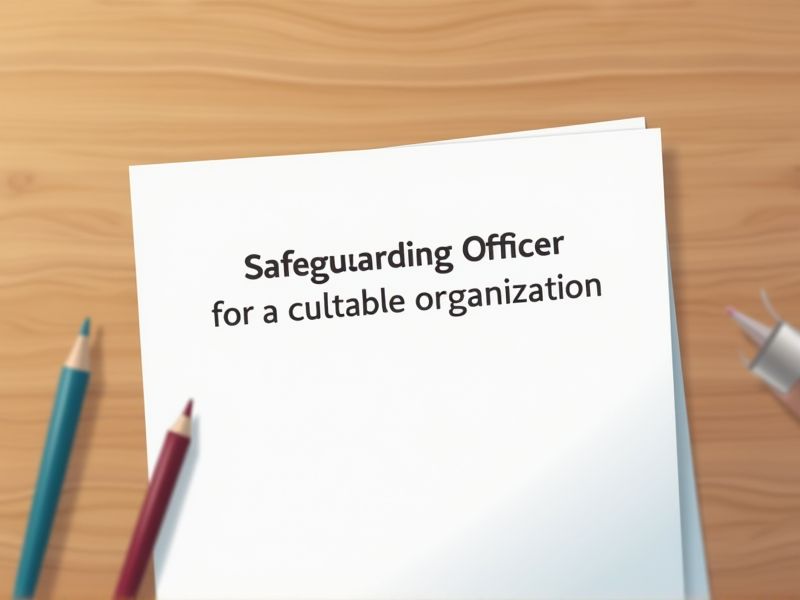
In a charitable organization, safeguarding vulnerable populations is paramount to maintaining trust and ensuring safety. Safeguarding Officers require certain certifications because they provide the necessary skills and knowledge to effectively identify and manage potential risks. Certifications also demonstrate an officer's commitment to adhering to legal standards and best practices in protection. Consider these important certifications for a Safeguarding Officer in a charitable organization.
Certificate in Child Protection and Safeguarding
A Certificate in Child Protection and Safeguarding equips a Safeguarding Officer with essential knowledge to identify and address potential risks to children effectively. This qualification ensures adherence to legal and ethical standards, enhancing the organization's credibility and trust among stakeholders. Having this certification allows for the implementation of best practices, reducing the likelihood of neglect or abuse. This certification enhances the organization's ability to train staff adequately, ensuring a culture of safety and responsibility across all levels.
Certificate in Adult Safeguarding
The presence of a Certificate in Adult Safeguarding enhances a Safeguarding Officer's ability to identify and address risks effectively within a charitable organization. Proper training equips them with the essential knowledge to implement regulatory frameworks and ensure compliance with safeguarding policies. With this certification, officers can foster a safer environment, crucial for maintaining trust and credibility with beneficiaries and stakeholders. It helps in equipping the officer to handle sensitive situations with appropriate expertise, reducing potential harm or liability for the organization.
Certificate in Vulnerable Persons Safeguarding
Having a Certificate in Vulnerable Persons Safeguarding equips a Safeguarding Officer with specialized skills to identify and address risks effectively. It ensures that the officer is up-to-date with legal requirements and best practices, crucial for maintaining compliance and protecting the organization's reputation. This certification provides evidence-based strategies for identifying signs of abuse or neglect, thereby enhancing the overall safety of vulnerable individuals in a charitable setting. It reassures stakeholders, including donors and beneficiaries, that the organization prioritizes the well-being of those it serves.
Advanced Safeguarding and Risk Management Certification
Achieving Advanced Safeguarding and Risk Management Certification equips Safeguarding Officers with current and comprehensive knowledge to effectively protect vulnerable populations within charitable organizations. This certification ensures that officers can identify and mitigate potential risks accurately, reducing incidents of neglect or harm. By understanding complex safeguarding challenges, officers can implement robust policies tailored to their organization's unique needs. Enhanced skills gained from this certification contribute to increased trust and credibility among stakeholders and beneficiaries.
GDPR Compliance and Data Protection Certification
GDPR compliance ensures that the safeguarding officer manages personal data in alignment with legal requirements, reducing liability risks for the charitable organization. Effective data protection practices foster trust with donors and beneficiaries by demonstrating a commitment to privacy and security. Certification in data protection equips the safeguarding officer with the necessary skills to identify and mitigate data-related threats. Regulatory adherence through GDPR and certifications enhances the organization's credibility and operational integrity.
Equality, Diversity, and Inclusion in Safeguarding Certification
Ensuring equality, diversity, and inclusion (EDI) in safeguarding certification equips safeguarding officers with the knowledge to address diverse needs and potential biases in charitable organizations. Such training emphasizes creating an inclusive environment that respects and values differences, thereby enhancing the organization's credibility and trustworthiness. Understanding EDI principles helps safeguarding officers recognize and mitigate discrimination, ensuring fair treatment for all individuals under their care. Emphasizing EDI in safeguarding practices strengthens organizational resilience by promoting diverse perspectives and innovative solutions in addressing complex safeguarding challenges.
Trauma-Informed Care Certification
Trauma-Informed Care Certification equips a Safeguarding Officer with the skills to recognize and address the impact of trauma, enhancing the protection of individuals in a charitable setting. Understanding trauma responses allows for more empathic communication, reducing the risk of re-traumatization. This certification ensures that safeguarding practices are aligned with current psychological insights, improving support strategies. Enhanced trauma-informed knowledge can strengthen trust between the organization and those it serves, leading to more effective interventions.
Ethical Leadership in Nonprofit Organizations Certification
Ethical Leadership in Nonprofit Organizations Certification equips safeguarding officers with essential knowledge to ensure accountability and transparency within charitable organizations. This certification provides officers with the skills to address ethical dilemmas and prevent misconduct that could harm vulnerable populations. Understanding ethical principles strengthens their ability to implement policies that protect the organization's integrity and assets. Trust from stakeholders and the community increases when safeguarding officers demonstrate a certified commitment to ethical leadership.
Safeguarding Policy and Practice Certification
Charitable organizations often work with vulnerable groups, making it essential for safeguarding officers to have certification that ensures they can identify and address potential harm. Certification provides officers with the necessary skills to implement effective safeguarding policies, thereby enhancing the organization's credibility. Certified officers are better equipped to understand legal requirements, reducing the risk of non-compliance and potential liabilities. A formal qualification serves to reassure both stakeholders and beneficiaries that their safety is a priority for the organization.
First Aid and Mental Health Awareness Certification
Safeguarding officers with First Aid and Mental Health Awareness Certification are essential in charitable organizations because they often encounter individuals in vulnerable situations, including physical and mental health crises. Knowledge in first aid can empower these officers to provide immediate and potentially life-saving assistance during emergencies. Understanding mental health awareness equips them to recognize and address psychological distress, creating a safer and more supportive environment. Certification in these areas also aligns with legal and ethical standards for ensuring the well-being of both service users and staff.
Summary
You, as a reader, can expect enhanced trust in the organization's commitment to safety when the Safeguarding Officer obtains certifications. Certifications can improve risk management by providing the officer with advanced skills and knowledge. The organization is likely to experience fewer incidents and better compliance with regulations. Staff and beneficiaries might feel more confident and secure, increasing overall engagement and support.
